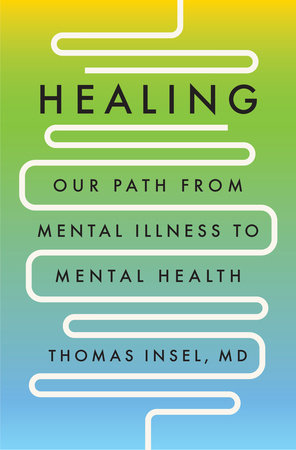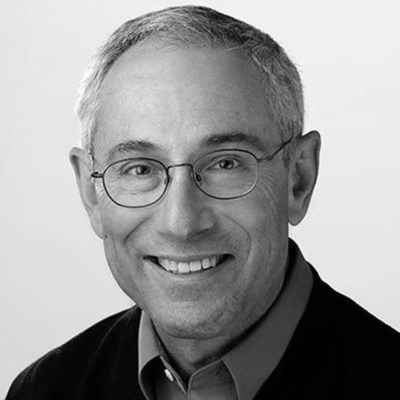
Tom Insel’s new book- A tremendous and important read.
(2-17-22) A much anticipated book by Dr. Thomas R. Insel, who directed the National Institutes of Mental Health between 2002 to 2015, will be published February 22nd but is available now for preorder. I am an unabashed fan of Dr. Insel and am happily endorsing: HEALING: Our Path From Mental Illness To Mental Health.
In addition to being a passionate advocate, Dr. Insel is a compassionate doctor. Several months ago, I told him about a friend whose husband was showing symptoms of a serious mental illness. Even though Dr. Insel was swamped and had little time, he telephoned the family, spent more than an hour talking to the husband and wife, and pulled strings so the husband could get a treatment bed, enabling him to achieve the help that he needed to fully recover.
The Atlantic magazine published an excerpt of the first chapter of his book this week. In that opening chapter, Dr. Insel recalls how he was doing a power point presentation at a mental health convention that showed the progress NIMH funded scientists were achieving studying the brain. Here’s what happened next.
A tall, bearded man in the back of the room wearing a flannel shirt appeared more and more agitated. When the Q&A period began, he jumped to the microphone. “You really don’t get it,” he said. “My 23-year-old son has schizophrenia. He has been hospitalized five times, made three suicide attempts, and now he is homeless. Our house is on fire and you are talking about the chemistry of the paint.” As I stood there somewhat dumbstruck, he asked, “What are you doing to put out this fire?”
In his new book, Dr. Insel describes how we can put out that fire.
HEALING: Our Path From Mental Illness To Mental Health by Thomas Insel.
Excerpt used by permission.
Beyond Stigma
Some years ago, the actress Glenn Close filmed a public service announcement that I will never forget. It’s just Glenn sitting on a stool in a spotlight on an empty stage, looking directly into the camera. In a flat tone she states slowly and quietly, “I have a mental illness.” After an awkward three second pause, she adds, “in my family.” In this simple message she is challenging us to consider how our feelings changed across those three seconds. Faced with someone’s admission of a mental illness, are we afraid, repelled, judgmental? How much does adding “in my family” change our reaction from fear and avoidance to empathy and support?
When I began looking at the mental health crisis as a journalist instead of a psychiatrist, I suddenly realized that the majority of the caregiving that goes on in the world is administered not by doctors and nurses but by families and communities. In nearly every conversation I had with families and advocates, they pointed to “stigma” as the biggest problem in mental health. Stigma is why there is inadequate insurance coverage. Stigma is why there is too little funding for research. Stigma is why we have not made more progress in curing mental disorders. Stigma creates the “othering” of people with mental illness, the implicit judgment that Glenn Close was trying to reveal. Glenn, who does indeed have family members with SMI, has now devoted herself to fighting stigma through her foundation, Bring Change 2 Mind.
And, as she says, stigma is why people do not get treatment.
To me, “stigma” invokes victimization and, unfortunately, inaction.
I prefer the term “discrimination” which heralds a call for social justice. We need a civil rights movement to overcome two centuries of exclusion from care. In terms of healthcare, people with serious mental illness are not just in the bottom quartile of outcomes. They are cordoned off from the rest of society. We should call this what it is: discrimination, fueled by fear and ignorance.
This is not to say that fear and avoidance are necessarily irrational. Mental health advocates and anti-stigma campaigners may not want to hear this, but the data are clear.

Dr. Thomas Insel
People with untreated mental illness are more likely to be irrational, disruptive, and yes, violent than people without SMI. Usually that violence is self-directed, leading to suicide or self-injury. And the data are equally compelling that people treated for a mental illness are not more likely to be violent than those without mental illness. Indeed, they are more likely to be victims not perpetrators. The research reminds us that fear and avoidance are consequences of lack of treatment, not presence of illness. Which begs the question: Why do so few people receive treatment?
No Treatment Please: Image of ECT flawed
For mental disorders the stigma about treatment might surpass the negative attitudes towards the disorders themselves. Perhaps that is why employment forms may inquire if you have cancer, diabetes, heart disease, or a history of being treated for a mental condition. As if getting treatment was the problem and not the solution.
Consider electroconvulsive therapy or ECT. This treatment is effective in about 80% of people with severe depression, including 50% of those for whom all other treatments have failed. Yet, ECT remains reserved as treatment of last resort for severe depression, available in only 6% of facilities offering mental health treatment. A national survey of privately insured patients found only 0.25% of people with depression treated with ECT.
Imagine that we had a treatment that would reverse Alzheimer’s Disease in 80% of people and no one used it, except under extraordinary circumstances. Imagine that this treatment was reimbursed my Medicare, approved by the FDA (citing evidence from 60 randomized clinical trials), available for over 80 years, and yet only 6% of facilities offered it and less than 1% of patients received it.
And it’s not just ECT – there is something deeper here. A few years ago, the British newspaper The Guardian ran a feature story about changing patterns of medication use in Britain. Several medications including anti-hypertensives, cholesterol lowering drugs, and antidepressants had increased in use. For all other medications this was a good news story – more people were getting care. But for antidepressants this was a scandal – more people being drugged.
What’s going on here? Is this negative attitude about treatment the result of ignorance or discrimination? Are modern therapies tainted by the legacy of lobotomy and hypothermia? Is there a sense that mental illness is more a social construct rather than a medical problem, so that treatments are just part of a vast marketing conspiracy? Or is there an implicit bias that people with mental illness do not warrant the investment in treatment, that they should just get it together and stop expecting insurance to subsidize their laziness?
I confess to once having the same bias against medication.
Even after running clinical trials of new drugs and observing dramatic responses to medications in my patients, I was reluctant to use psychiatric medication in my own family. When my son showed every sign of ADHD, my wife and I reached for therapy, a special school, and parent training before we considered a stimulant drug. Our whole grain, no sugar, eight-year old on a psychotropic drug? No way, until a child psychiatrist friend recommended a pilot trial of methylphenidate (sold under the trade name Ritalin). Unlike antidepressants and antipsychotics, stimulants have rapid effects. Within a few hours we watched our whirling dervish slow down, put away his toys, and begin to listen for the first time. We were stunned. But our son was unimpressed. We asked him about the medication a week later. His response remains one of the most convincing statements I have ever heard about psychopharmacology. “Doesn’t do much for me, Dad, but it makes everybody else a lot nicer.”
What gets lost in the discussion about discrimination and negative attitudes about treatment and even civil rights, is the complicated experience of having a mental illness. Whereas cancer patients will fight to get care, people with psychosis will fight to resist it. This resistance is, in part, about the side-effects of medications or the indignity of hospitalization, but also in many cases because the irrationality of psychosis confers a kind of cognitive blindness complete with a certainty in paranoid delusions and a grandiosity that everyone else is missing the truth.
And people with mental illness are certainly not immune to our cultural hostility towards psychiatric treatment.
A few years ago, I talked with a young man who had survived a horrific suicide attempt. He had never been treated for his depression before the attempt. When I asked him about this, he explained, “I had to decide. Do I want to kill myself or do I want to see a psychiatrist? I hated myself enough to want to die, but not so much that I would become a mental patient.” Think about that for a moment. He literally would rather die than seek psychiatric treatment. It is more difficult to imagine that someone with cancer or serious heart disease would refuse treatment in this way. But if they did, yes, we would probably refer them for psychiatric help.
ABOUT THE AUTHOR:
Tom lnsel, M.D., a psychiatrist and neuroscientist, has been a national leader in mental health research, policy, and technology. From 2002-2015, Dr. Insel served as Director of the National Institute of Mental Health (NIMH). More recently (2015 – 2017), he led the Mental Health Team at Verily (formerly Google Life Sciences) in South San Francisco, CA. In 2017 he co-founded Mindstrong Health, a Silicon Valley start-up building tools for people with serious mental illness. In 2019, Dr. Insel served as a special advisor to California Governor Gavin Newsom, helping on behavioral health issues. In 2020, he co-founded Humanest Care, a therapeutic online community for recovery. He is currently Chair of the Board of the Steinberg Institute and serves on the boards of Fountain House, Foundation for NIH, and the Schaeffer Center for Health Policy as well as being an advisor to several mental health start-ups. He is the author of the forthcoming book Healing: Our Path from Mental Illness to Mental Health, to be published by Penguin Random House in February 2022. With journalist co-founders, he recently launched MindSite News (www.mindsitenews.org), a non-profit digital publication focused on mental health issues. Dr. Insel is a member of the National Academy of Medicine and has received numerous national and international awards including honorary degrees in the U.S. and Europe.
- https://www.facebook.com/thomasinselmd
- https://twitter.com/thomasinselmd
- https://www.linkedin.com/in/thomasinselmd/



